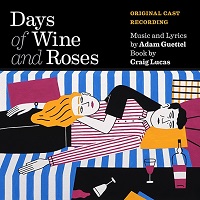 Original Cast, 2023 (Nonesuch)
Original Cast, 2023 (Nonesuch)  (5 / 5) Days of Wine and Roses marks the first musical with a score by composer/lyricist Adam Guettel that has been produced since Guettel’s triumph with The Light in the Piazza in 2005, and it was well worth the wait. Recorded in advance of the show’s Broadway premiere but after its initial production at the Atlantic Theater Company, this cast album is a beautiful gut punch. The music is different from any Broadway score of recent memory — full of earworms without being simple, and harmonically fascinating while remaining deliciously tonal. The orchestrations, which delight the ear, were also provided by Guettel. With a book by Craig Lucas, Days of Wine and Roses is based on the film of the same title. Brian d’Arcy James and Kelli O’Hara star as the show’s central couple, Kirsten Arnesen and Joe Clay, who meet on a boat (the album begins with the sound of rushing waves) and end up embarking on a devastating descent into alcoholism, each pulling the other further down. “Evanesce,” the song that the couple sings when they start drinking together, is a jazzy delight, complicated by ominous lyrics that predict their future (“Two dolphins breaking away / Two dolphins right to the grave/ Are we”). With the exception of the sweet-voiced Ella Dane Morgan as the couple’s young daughter, Lila, hardly any other performers are heard on the album; but James and O’Hara sing so well, and their voices blend so beautifully, that listeners won’t mind at all. O’Hara’s soprano has only become more colorful and expansive since she starred in Piazza, and “There Go I,” a beautiful ballad with evocative lyrics, serves as a showcase for her wondrous talent. “As The Water Loves The Stone” is one of the most heartfelt love songs this reviewer has ever heard, while the couple’s individual “mad scene” songs, “435” and “Morton Salt Girl,” would serve as playgrounds for any actor. The overall tone of the score is very sad, and many listeners may find themselves becoming emotional. It’s hard not to cry during “Turlycue,” the plaintive duet between a suffering mother and a confused daughter, and the joyfulness of “First Breath” becomes quite moving due to the direction of the plot. No musical theater maven should be without this recording; whether it haunts you, inspires you, or even triggers you, it’s certain to have a profound effect. — Charles Kirsch
(5 / 5) Days of Wine and Roses marks the first musical with a score by composer/lyricist Adam Guettel that has been produced since Guettel’s triumph with The Light in the Piazza in 2005, and it was well worth the wait. Recorded in advance of the show’s Broadway premiere but after its initial production at the Atlantic Theater Company, this cast album is a beautiful gut punch. The music is different from any Broadway score of recent memory — full of earworms without being simple, and harmonically fascinating while remaining deliciously tonal. The orchestrations, which delight the ear, were also provided by Guettel. With a book by Craig Lucas, Days of Wine and Roses is based on the film of the same title. Brian d’Arcy James and Kelli O’Hara star as the show’s central couple, Kirsten Arnesen and Joe Clay, who meet on a boat (the album begins with the sound of rushing waves) and end up embarking on a devastating descent into alcoholism, each pulling the other further down. “Evanesce,” the song that the couple sings when they start drinking together, is a jazzy delight, complicated by ominous lyrics that predict their future (“Two dolphins breaking away / Two dolphins right to the grave/ Are we”). With the exception of the sweet-voiced Ella Dane Morgan as the couple’s young daughter, Lila, hardly any other performers are heard on the album; but James and O’Hara sing so well, and their voices blend so beautifully, that listeners won’t mind at all. O’Hara’s soprano has only become more colorful and expansive since she starred in Piazza, and “There Go I,” a beautiful ballad with evocative lyrics, serves as a showcase for her wondrous talent. “As The Water Loves The Stone” is one of the most heartfelt love songs this reviewer has ever heard, while the couple’s individual “mad scene” songs, “435” and “Morton Salt Girl,” would serve as playgrounds for any actor. The overall tone of the score is very sad, and many listeners may find themselves becoming emotional. It’s hard not to cry during “Turlycue,” the plaintive duet between a suffering mother and a confused daughter, and the joyfulness of “First Breath” becomes quite moving due to the direction of the plot. No musical theater maven should be without this recording; whether it haunts you, inspires you, or even triggers you, it’s certain to have a profound effect. — Charles Kirsch
All posts by Michael Portantiere
Evening Primrose
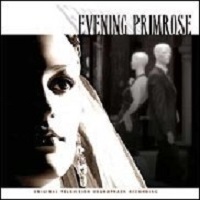 Television Cast, 1966 (Kritzerland)
Television Cast, 1966 (Kritzerland)  (3 / 5) Stephen Sondheim provided a brief but compelling score for this TV musical with a teleplay by James Goldman, based on a short story by John Collier. It tells the odd tale of a struggling poet named Charles, who decides to retreat from society by remaining in a Manhattan department store after closing time; he apparently intends to remain there alone indefinitely, retreating to the store’s nether regions during business hours, but soon he comes upon a small group of people who have decided to do the same thing. Charles falls in love with Ella, a young woman who has lived in the store since early childhood and barely remembers the outside world. In the telecast, Charles was played by Anthony Perkins, Ella by Charmian Carr. No cast album was released until 2008, when Krizerland transferred the soundtrack recordings of the songs to CD. Since it was never a stage musical and is unlikely ever to be one, Evening Primrose doesn’t warrant a lengthy review here, but it must be said that the four-song score contains two of the best ballads Sondheim ever wrote: Ella’s touching reminiscence “I Remember,” and the gorgeous duet “Take Me to the World.” Perkins, who had not very successfully tried his hand as a musical theater leading man in the 1960 Broadway show Greenwillow, is well cast and persuasive as Charles, while Carr, best known for her performance as Liesl in the mega-hit film version of The Sound of Music, is a plaintive Ella. The mid-’60s monaural sound quality of the recording is not great but acceptable. [Note: The full, 52-minute telecast is available separately on home video.] — Michael Portantiere
(3 / 5) Stephen Sondheim provided a brief but compelling score for this TV musical with a teleplay by James Goldman, based on a short story by John Collier. It tells the odd tale of a struggling poet named Charles, who decides to retreat from society by remaining in a Manhattan department store after closing time; he apparently intends to remain there alone indefinitely, retreating to the store’s nether regions during business hours, but soon he comes upon a small group of people who have decided to do the same thing. Charles falls in love with Ella, a young woman who has lived in the store since early childhood and barely remembers the outside world. In the telecast, Charles was played by Anthony Perkins, Ella by Charmian Carr. No cast album was released until 2008, when Krizerland transferred the soundtrack recordings of the songs to CD. Since it was never a stage musical and is unlikely ever to be one, Evening Primrose doesn’t warrant a lengthy review here, but it must be said that the four-song score contains two of the best ballads Sondheim ever wrote: Ella’s touching reminiscence “I Remember,” and the gorgeous duet “Take Me to the World.” Perkins, who had not very successfully tried his hand as a musical theater leading man in the 1960 Broadway show Greenwillow, is well cast and persuasive as Charles, while Carr, best known for her performance as Liesl in the mega-hit film version of The Sound of Music, is a plaintive Ella. The mid-’60s monaural sound quality of the recording is not great but acceptable. [Note: The full, 52-minute telecast is available separately on home video.] — Michael Portantiere
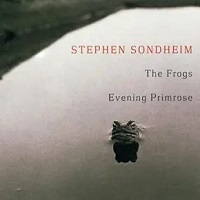 Studio Cast, 2001 (Nonesuch)
Studio Cast, 2001 (Nonesuch)  (4 / 5) The first part of this essential album contains the first commercial recordings of the songs that Sondheim wrote for The Frogs (see separate review, under that title). The second part is devoted to his even-briefer score for Evening Primrose, the 1966 TV musical that concerns the drop-out poet Charles’s encounter with, as Frank Rich phrases it in his notes for this recording, “a mysterious nocturnal society of eccentric shut-ins as well as the muse he’s been searching for, a sort of modern Rapunzel named Ella.” Here, Charles and Ella are sung by Neil Patrick Harris and Theresa McCarthy. Both do fine jobs of delivering the highlights of this mini-musical that are mentioned in the review above, as well as the score’s only other two numbers: Charles’s character-establishing “If You Can Find Me, I’m Here” and the extended duet “When?” All of the songs benefit greatly from Jonathan Tunick’s typically superb orchestrations as played by the American Theatre Orchestra under the baton of Sondheim specialist Paul Gemignani. The CD boasts Nonesuch’s usual, first-rate recorded sound: powerful but not harsh, ambient but not overly reverberant, with great dynamic range. — M.P.
(4 / 5) The first part of this essential album contains the first commercial recordings of the songs that Sondheim wrote for The Frogs (see separate review, under that title). The second part is devoted to his even-briefer score for Evening Primrose, the 1966 TV musical that concerns the drop-out poet Charles’s encounter with, as Frank Rich phrases it in his notes for this recording, “a mysterious nocturnal society of eccentric shut-ins as well as the muse he’s been searching for, a sort of modern Rapunzel named Ella.” Here, Charles and Ella are sung by Neil Patrick Harris and Theresa McCarthy. Both do fine jobs of delivering the highlights of this mini-musical that are mentioned in the review above, as well as the score’s only other two numbers: Charles’s character-establishing “If You Can Find Me, I’m Here” and the extended duet “When?” All of the songs benefit greatly from Jonathan Tunick’s typically superb orchestrations as played by the American Theatre Orchestra under the baton of Sondheim specialist Paul Gemignani. The CD boasts Nonesuch’s usual, first-rate recorded sound: powerful but not harsh, ambient but not overly reverberant, with great dynamic range. — M.P.
Back to the Future
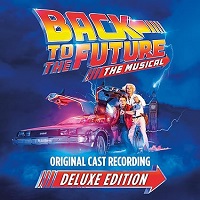 Original London Cast, 2022 (Masterworks Broadway) No stars; not recommended. These days, when you hear that a beloved movie is getting turned into a musical, it sounds less like an announcement and more like a threat. Yes, movies have inspired great musicals in the past., but the modern trend of these “adaptations” leans toward slavishly faithful recreations of the cinematic source material, with a couple of by-the-numbers songs pinned on. Enter Back to the Future: The Musical, which takes reverence to a new level. The script is by Bob Gale, who co-wrote the original movie’s screenplay and has spent decades overseeing the franchise; and the score is by Glen Ballard and Alan Silvestri, the latter of whom composed the music for the original movie and its sequels. Based on the classic 1985 original starring Michael J. Fox, the story tells of a kid living in the 1980s who accidentally goes back in time and meets his parents when they were teenagers. The stage musical version that yielded this recording first opened in the West End, then transferred to Broadway. (No cast album of that production has yet been recorded or released.) It’s a very lazy adaptation: From the beginning of the “Overture,” in which not a single note of any of the new music written for the show is heard, you can tell what the creative team’s intentions were. Instead, you get the movie’s recognizable theme in a heavily flourished arrangement, which ends up sounding like the product of a computer program. Ethan Popp and Bryan Cook’s orchestrations sound better in the actual songs, which unfortunately range in quality from instantly forgettable (“Got No Future” and “Future Boy”) to instantly regrettable (“My Myopia” and “Teach Him a Lesson”). Most of the lyrics sound like they were done on a first pass, while many of the melodies are vaguely reminiscent of better tunes. When the writers aren’t going for the most basic concepts in their songs, they decide to adhere even more faithfully to the movie by incorporating the exact same ’50s pop hits in the final sequence (“Earth Angel” and “Johnny B. Goode”) before tacking on the movie’s Oscar-nominated “The Power of Love” at the end. The cast is made up of talented singers, with Olly Dobson and Roger Bart starring as the iconic duo of Marty McFly and Doc Brown, respectively, but they’re mostly tasked with having to shoot for the ceiling of their vocal registers in every song. And when they’re not navigating the vocal demands, they’re forced into a competition of who can provide the most uncanny impression of their film counterparts; Hugh Coles as George McFly easily wins with an eerie imitation of Crispin Glover. If Gale, Silvestri and Ballard had been willing to take any creative chances, or alternatively had stepped aside for a team of writers who would have done so, this show might have been surprisingly delightful and/or enjoyably campy. But as it stands, there’s nothing about Back to the Future: The Musical that makes any strong argument for its existence. — Matt Koplik
Original London Cast, 2022 (Masterworks Broadway) No stars; not recommended. These days, when you hear that a beloved movie is getting turned into a musical, it sounds less like an announcement and more like a threat. Yes, movies have inspired great musicals in the past., but the modern trend of these “adaptations” leans toward slavishly faithful recreations of the cinematic source material, with a couple of by-the-numbers songs pinned on. Enter Back to the Future: The Musical, which takes reverence to a new level. The script is by Bob Gale, who co-wrote the original movie’s screenplay and has spent decades overseeing the franchise; and the score is by Glen Ballard and Alan Silvestri, the latter of whom composed the music for the original movie and its sequels. Based on the classic 1985 original starring Michael J. Fox, the story tells of a kid living in the 1980s who accidentally goes back in time and meets his parents when they were teenagers. The stage musical version that yielded this recording first opened in the West End, then transferred to Broadway. (No cast album of that production has yet been recorded or released.) It’s a very lazy adaptation: From the beginning of the “Overture,” in which not a single note of any of the new music written for the show is heard, you can tell what the creative team’s intentions were. Instead, you get the movie’s recognizable theme in a heavily flourished arrangement, which ends up sounding like the product of a computer program. Ethan Popp and Bryan Cook’s orchestrations sound better in the actual songs, which unfortunately range in quality from instantly forgettable (“Got No Future” and “Future Boy”) to instantly regrettable (“My Myopia” and “Teach Him a Lesson”). Most of the lyrics sound like they were done on a first pass, while many of the melodies are vaguely reminiscent of better tunes. When the writers aren’t going for the most basic concepts in their songs, they decide to adhere even more faithfully to the movie by incorporating the exact same ’50s pop hits in the final sequence (“Earth Angel” and “Johnny B. Goode”) before tacking on the movie’s Oscar-nominated “The Power of Love” at the end. The cast is made up of talented singers, with Olly Dobson and Roger Bart starring as the iconic duo of Marty McFly and Doc Brown, respectively, but they’re mostly tasked with having to shoot for the ceiling of their vocal registers in every song. And when they’re not navigating the vocal demands, they’re forced into a competition of who can provide the most uncanny impression of their film counterparts; Hugh Coles as George McFly easily wins with an eerie imitation of Crispin Glover. If Gale, Silvestri and Ballard had been willing to take any creative chances, or alternatively had stepped aside for a team of writers who would have done so, this show might have been surprisingly delightful and/or enjoyably campy. But as it stands, there’s nothing about Back to the Future: The Musical that makes any strong argument for its existence. — Matt Koplik13
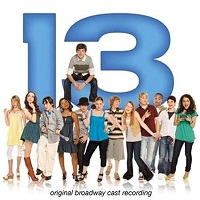 Original Broadway Cast, 2008 (Ghostlight)
Original Broadway Cast, 2008 (Ghostlight)  (2 / 5) Musical theater writers from Strouse and Adams to Pasek and Paul have tried to write musicals capturing the spirit of what it means to be a teenager. As a teen myself (at this writing), I have to report that Jason Robert Brown’s 13 is pretty far off the target. Brown, who has written brilliant and complex musicals about adults, did not apply the layers to these young characters that they deserve, instead choosing to employ stereotypes and a paper-thin plotline that does not merit such a lengthy score. The show tells the story of about-to-be Bar Mitzvah boy Evan (portrayed admirably by Graham Phillips), who finds his life uprooted after his parents get divorced and he is forced to move from New York City to a town in Indiana, referred to by the show’s best known song as “The Lamest Place in the World.” The opening number/title song is quite catchy and fun, but the score goes downhill from there. One of the oddest touches is “Terminal Illness,” a comedic song that Evan sings to his friend Archie (Aaron Simon Gross), who has been diagnosed with muscular dystrophy, as a way of convincing him to use his disease for emotional manipulation of others. The song comes across as not only tone-deaf, but so upsetting in reference to a 13-year-old boy that its place at the beginning of the album lost this listener. The more fun moments in 13 are conveyed in admittedly simple music and lyrics, such as the cheerleading blast “Opportunity” (cut from the stage show but included on the recording) and the doo-wop-inspired “Bad, Bad News.” This show deserves credit for casting actors whose ages were close to those of their characters, but that’s not entirely an upside, as the voices of the pubescent actors sometimes sound pretty rough and untrained. That said, 13 served as a very early credit for future superstars Elizabeth Gillies and Ariana Grande. Both of them give charming performances, but in the end, none of the earnest cast members can salvage the material, especially the show’s almost laughably predictable conclusion: “A Little More Homework.” Nor are they helped by the fact that every song is about twice as long as it needs to be. Puberty is unquestionably difficult to get through, but did a musical about it need to give us the same feeling? — Charles Kirsch
(2 / 5) Musical theater writers from Strouse and Adams to Pasek and Paul have tried to write musicals capturing the spirit of what it means to be a teenager. As a teen myself (at this writing), I have to report that Jason Robert Brown’s 13 is pretty far off the target. Brown, who has written brilliant and complex musicals about adults, did not apply the layers to these young characters that they deserve, instead choosing to employ stereotypes and a paper-thin plotline that does not merit such a lengthy score. The show tells the story of about-to-be Bar Mitzvah boy Evan (portrayed admirably by Graham Phillips), who finds his life uprooted after his parents get divorced and he is forced to move from New York City to a town in Indiana, referred to by the show’s best known song as “The Lamest Place in the World.” The opening number/title song is quite catchy and fun, but the score goes downhill from there. One of the oddest touches is “Terminal Illness,” a comedic song that Evan sings to his friend Archie (Aaron Simon Gross), who has been diagnosed with muscular dystrophy, as a way of convincing him to use his disease for emotional manipulation of others. The song comes across as not only tone-deaf, but so upsetting in reference to a 13-year-old boy that its place at the beginning of the album lost this listener. The more fun moments in 13 are conveyed in admittedly simple music and lyrics, such as the cheerleading blast “Opportunity” (cut from the stage show but included on the recording) and the doo-wop-inspired “Bad, Bad News.” This show deserves credit for casting actors whose ages were close to those of their characters, but that’s not entirely an upside, as the voices of the pubescent actors sometimes sound pretty rough and untrained. That said, 13 served as a very early credit for future superstars Elizabeth Gillies and Ariana Grande. Both of them give charming performances, but in the end, none of the earnest cast members can salvage the material, especially the show’s almost laughably predictable conclusion: “A Little More Homework.” Nor are they helped by the fact that every song is about twice as long as it needs to be. Puberty is unquestionably difficult to get through, but did a musical about it need to give us the same feeling? — Charles Kirsch
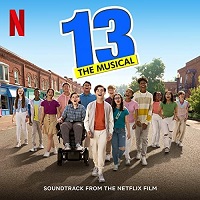 Film Soundtrack, 2022 (Netflix Music)
Film Soundtrack, 2022 (Netflix Music)  (4 / 5) Right from the start of this recording, it’s easy to tell that the score of 13 has been completely redone for the Netflix film version — but that’s not a bad thing. Vocals are provided by child actors including the charming Eli Golden as Evan and Gabriella Uhl, who is talented beyond her years, as his neighbor Patrice. These performances combined with new, pop orchestrations make 13 what it always should’ve been: a high-octane, if slightly generic, romp. In this form, with 30 minutes of musical filler taken out and three new songs added, the score is far better suited to the thin story and manages to make more of an impact by trying to do less. Brown’s new compositions are noteworthy, especially “It Would Be Funny,” a heartfelt and catchy duet for Evan and the added character of his mother (played nicely by Debra Messing). “The Bloodmaster” is an excellent song for a moment that always should have been musicalized. “I’ve Been Waiting” uses the lead vocals of Lindsey Blackwell to bring a more up-to-date musical style to the score. Bonus tracks include an admirable rendition of “What It Means to Be a Friend,” sadly cut from the final product, and an auto-tuned cover of “Tell Her” by Alec Benjamin that effectively hides the song’s sappy lyrics. While purists will prefer a fuller version of the score, those seeking a shorter and sweeter listening experience should choose the Netflix album. — C.K.
(4 / 5) Right from the start of this recording, it’s easy to tell that the score of 13 has been completely redone for the Netflix film version — but that’s not a bad thing. Vocals are provided by child actors including the charming Eli Golden as Evan and Gabriella Uhl, who is talented beyond her years, as his neighbor Patrice. These performances combined with new, pop orchestrations make 13 what it always should’ve been: a high-octane, if slightly generic, romp. In this form, with 30 minutes of musical filler taken out and three new songs added, the score is far better suited to the thin story and manages to make more of an impact by trying to do less. Brown’s new compositions are noteworthy, especially “It Would Be Funny,” a heartfelt and catchy duet for Evan and the added character of his mother (played nicely by Debra Messing). “The Bloodmaster” is an excellent song for a moment that always should have been musicalized. “I’ve Been Waiting” uses the lead vocals of Lindsey Blackwell to bring a more up-to-date musical style to the score. Bonus tracks include an admirable rendition of “What It Means to Be a Friend,” sadly cut from the final product, and an auto-tuned cover of “Tell Her” by Alec Benjamin that effectively hides the song’s sappy lyrics. While purists will prefer a fuller version of the score, those seeking a shorter and sweeter listening experience should choose the Netflix album. — C.K.
Harmony
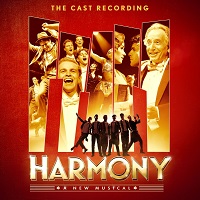 Original Broadway Cast, 2023 (Sh-K-Boom)
Original Broadway Cast, 2023 (Sh-K-Boom)  (4 / 5) It took Barry Manilow and Bruce Sussman’s musical Harmony 26 years to get to Broadway, more than four times as long a period as the Comedian Harmonists themselves performed across the globe before being fractured by the Nazi regime. What we have here is not only a recounting of the sad but true story of that group but also a tribute to musical theater itself, with various songs reminiscent of the work of Gilbert & Sullivan, Sondheim, and Bock & Harnick. This score’s “The Wedding” has to be one of the most effective uses of traditional-sounding Jewish melodies since Fiddler on the Roof, and the 11 o’clock number ends with a dramatic rendition of the “Sh’ma,” in what may be a knowing nod to Jason Robert Brown’s Parade. The young men who play the Comedian Harmonists, including Sean Bell and Danny Kornfeld as the two who seem most central to the plot, unquestionably produce skillful and satisfying harmonies, even if the timbre of their voices doesn’t quite suggest the era in which the show is set. Chip Zien, as an older version of one of the group, is tasked with narrating the show, and his gravitas helps to balance out some of the less powerful lyrics. Two of the cast recording’s strongest points are the expert vocal performances of Julie Benko and Sierra Boggess, whose duet “Where You Go” is haunting and memorable; one only wishes they had more to do on the album. The songs range from sarcastic comments on the Nazi regime (“Come to the Fatherland”) to imitations of flimsy 1930s numbers (“We’re Going Loco,” which hews closely to Manilow’s hit “Copacabana”), and are made more enjoyable by the rich, snazzy orchestrations of Doug Walter. While this score may not be unique enough to merit a place of high honor in the canon, many listeners will agree that the 26-year journey paid off. — Charles Kirsch
(4 / 5) It took Barry Manilow and Bruce Sussman’s musical Harmony 26 years to get to Broadway, more than four times as long a period as the Comedian Harmonists themselves performed across the globe before being fractured by the Nazi regime. What we have here is not only a recounting of the sad but true story of that group but also a tribute to musical theater itself, with various songs reminiscent of the work of Gilbert & Sullivan, Sondheim, and Bock & Harnick. This score’s “The Wedding” has to be one of the most effective uses of traditional-sounding Jewish melodies since Fiddler on the Roof, and the 11 o’clock number ends with a dramatic rendition of the “Sh’ma,” in what may be a knowing nod to Jason Robert Brown’s Parade. The young men who play the Comedian Harmonists, including Sean Bell and Danny Kornfeld as the two who seem most central to the plot, unquestionably produce skillful and satisfying harmonies, even if the timbre of their voices doesn’t quite suggest the era in which the show is set. Chip Zien, as an older version of one of the group, is tasked with narrating the show, and his gravitas helps to balance out some of the less powerful lyrics. Two of the cast recording’s strongest points are the expert vocal performances of Julie Benko and Sierra Boggess, whose duet “Where You Go” is haunting and memorable; one only wishes they had more to do on the album. The songs range from sarcastic comments on the Nazi regime (“Come to the Fatherland”) to imitations of flimsy 1930s numbers (“We’re Going Loco,” which hews closely to Manilow’s hit “Copacabana”), and are made more enjoyable by the rich, snazzy orchestrations of Doug Walter. While this score may not be unique enough to merit a place of high honor in the canon, many listeners will agree that the 26-year journey paid off. — Charles Kirsch
Big City Rhythm
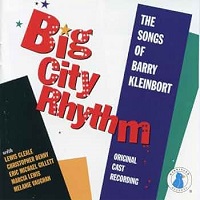 Original Off-Broadway Cast, 1996 (Original Cast Records)
Original Off-Broadway Cast, 1996 (Original Cast Records)  (3 / 5) The heyday of the intimate revue may have been decades ago, but some good ones have surfaced more recently. Consider Barry Kleinbort’s winning song cycle Big City Rhythm, blessed with a high-powered cast and Christopher Denny’s tasteful piano arrangements. As a composer-lyricist, Kleinbort has lots of range and is willing to serve up old-fashioned melody or new-fashioned lack thereof as suits the material. Some inside jokes may be lost on some listeners — for example, the salute to Broadway leading ladies who can’t sing — but those in the know will love them. Lots of stuff more accessible to the general public is here as well, including an extended medley of proposed theme songs for unlikely movies, one of the funniest of which is “Psycho, Are You Lonely Tonight?” Marcia Lewis is adorable as a peripatetic sophisticate in “I Get Around,” Lewis Cleale and Eric Michael Gillett are stalwart leading men, and Melanie Vaughan is exceedingly funny as a difficult chanteuse just out of the Betty Ford Clinic. Some of the strongest numbers are from Kleinbort’s proposed musical version of Garson Kanin’s The Rat Race; they’ll make you eager to hear more. — Marc Miller
(3 / 5) The heyday of the intimate revue may have been decades ago, but some good ones have surfaced more recently. Consider Barry Kleinbort’s winning song cycle Big City Rhythm, blessed with a high-powered cast and Christopher Denny’s tasteful piano arrangements. As a composer-lyricist, Kleinbort has lots of range and is willing to serve up old-fashioned melody or new-fashioned lack thereof as suits the material. Some inside jokes may be lost on some listeners — for example, the salute to Broadway leading ladies who can’t sing — but those in the know will love them. Lots of stuff more accessible to the general public is here as well, including an extended medley of proposed theme songs for unlikely movies, one of the funniest of which is “Psycho, Are You Lonely Tonight?” Marcia Lewis is adorable as a peripatetic sophisticate in “I Get Around,” Lewis Cleale and Eric Michael Gillett are stalwart leading men, and Melanie Vaughan is exceedingly funny as a difficult chanteuse just out of the Betty Ford Clinic. Some of the strongest numbers are from Kleinbort’s proposed musical version of Garson Kanin’s The Rat Race; they’ll make you eager to hear more. — Marc Miller
Bed & Sofa
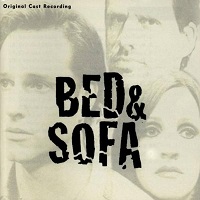 Original Off-Broadway Cast, 1996 (Varese Sarabande)
Original Off-Broadway Cast, 1996 (Varese Sarabande)  (4 / 5) A stylized, three-character “silent movie opera” by composer Polly Pen and playwright Lawrence Klavan, Bed & Sofa premiered just over a decade after Pen’s avant-garde Goblin Market. Like that show, it was presented Off-Broadway by the Vineyard Theatre, was directed by André Ernotte, and was showered with awards and nominations. Based on the 1927 Soviet film Tretya meshchanskaya by Abram Room and Victor Shklovsky, the piece centers on a married couple that invites the husband’s homeless army buddy to crash indefinitely on the sofa in their tiny flat. When the husband leaves town on business, his wife and friend embark on a passionate affair. Returning to find himself displaced in the bed, the husband winds up on the sofa. For a time, the resulting ménage à trois works pretty well, but then it’s beset by conflicts such as how to deal with the woman’s pregnancy and the mystery of which guy is the sire. Eventually, the woman discovers that her new man is as flawed as the old one, and she departs, leaving both sofa and bed to the men. Pen is often accused of lacking a flair for melody, but here she delivers a stunning score with dulcet arias that owe a debt to Mussorgsky, Prokofiev, and Russian folk tunes. With supervision by Ernotte and musical director Alan Johnson, Terri Klausner gives the wife earthiness and vigor, while Michael X. Martin as her spouse and Jason Workman as the interloper complete an ideally balanced ensemble. — Charles Wright
(4 / 5) A stylized, three-character “silent movie opera” by composer Polly Pen and playwright Lawrence Klavan, Bed & Sofa premiered just over a decade after Pen’s avant-garde Goblin Market. Like that show, it was presented Off-Broadway by the Vineyard Theatre, was directed by André Ernotte, and was showered with awards and nominations. Based on the 1927 Soviet film Tretya meshchanskaya by Abram Room and Victor Shklovsky, the piece centers on a married couple that invites the husband’s homeless army buddy to crash indefinitely on the sofa in their tiny flat. When the husband leaves town on business, his wife and friend embark on a passionate affair. Returning to find himself displaced in the bed, the husband winds up on the sofa. For a time, the resulting ménage à trois works pretty well, but then it’s beset by conflicts such as how to deal with the woman’s pregnancy and the mystery of which guy is the sire. Eventually, the woman discovers that her new man is as flawed as the old one, and she departs, leaving both sofa and bed to the men. Pen is often accused of lacking a flair for melody, but here she delivers a stunning score with dulcet arias that owe a debt to Mussorgsky, Prokofiev, and Russian folk tunes. With supervision by Ernotte and musical director Alan Johnson, Terri Klausner gives the wife earthiness and vigor, while Michael X. Martin as her spouse and Jason Workman as the interloper complete an ideally balanced ensemble. — Charles Wright
The Beautiful Game
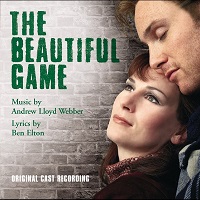 Original London Cast, 2000 (Telstar)
Original London Cast, 2000 (Telstar)  (3 / 5) Those who would type Andrew Lloyd Webber as a purveyor of lightweight poperettas may not know what to make of this tragic love story set against a background of social strife in Northern Ireland. Although the score lacks emotional variety, with too many sweet melodies, and Ben Elton’s frequently profane lyrics are hardly cliché-free, it’s a sincere attempt at something different and challenging from a composer who could certainly have rested on his laurels. Josie Walker and David Shannon sing attractively as Mary and John, the young couple whose lives are destroyed by the escalating violence between Catholics and Protestants. Walker partners beautifully with Dianne Pilkington as a Protestant girl in the unsettling “God’s Own Country” and makes something wrenching out of “If This Is What We’re Fighting For,” a bitter denunciation of the self-righteousness behind the violence. The title number has a harsh, celebratory vigor that one rarely associates with Lloyd Webber, who did the orchestrations with David Cullen. Although this score is far from a total success, the recording is well worth a listen — David Barbour
(3 / 5) Those who would type Andrew Lloyd Webber as a purveyor of lightweight poperettas may not know what to make of this tragic love story set against a background of social strife in Northern Ireland. Although the score lacks emotional variety, with too many sweet melodies, and Ben Elton’s frequently profane lyrics are hardly cliché-free, it’s a sincere attempt at something different and challenging from a composer who could certainly have rested on his laurels. Josie Walker and David Shannon sing attractively as Mary and John, the young couple whose lives are destroyed by the escalating violence between Catholics and Protestants. Walker partners beautifully with Dianne Pilkington as a Protestant girl in the unsettling “God’s Own Country” and makes something wrenching out of “If This Is What We’re Fighting For,” a bitter denunciation of the self-righteousness behind the violence. The title number has a harsh, celebratory vigor that one rarely associates with Lloyd Webber, who did the orchestrations with David Cullen. Although this score is far from a total success, the recording is well worth a listen — David Barbour
Ballad for Bimshire
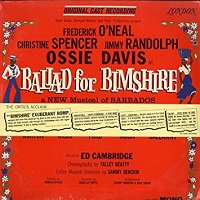 Original Off-Broadway Cast, 1963 (London/no CD)
Original Off-Broadway Cast, 1963 (London/no CD)  (1 / 5) This Off-Broadway oddity probably got produced because of the reputation of its composer, Irving Burgie — also known as Lord Burgess. Having written several songs that were popularized by Harry Belafonte, Burgie was one of the most prominent calypso writers of the period. But this show is more well meaning than well crafted; the writers and production team all had limited musical theater experience, and they produced a piece that, judging from the cast album, doesn’t seem to know what it wants to do or how to do it. Ballad for Bimshire clearly had a book — co-producer and co-star Ossie Davis, a driving force behind the production, narrates the story, but it’s not compelling and more than a little amorphous. The lyrics are negligible, which leaves only the tunes. They’re frequently appealing but, because they’re on their own, dramatically unrewarding. — David Wolf
(1 / 5) This Off-Broadway oddity probably got produced because of the reputation of its composer, Irving Burgie — also known as Lord Burgess. Having written several songs that were popularized by Harry Belafonte, Burgie was one of the most prominent calypso writers of the period. But this show is more well meaning than well crafted; the writers and production team all had limited musical theater experience, and they produced a piece that, judging from the cast album, doesn’t seem to know what it wants to do or how to do it. Ballad for Bimshire clearly had a book — co-producer and co-star Ossie Davis, a driving force behind the production, narrates the story, but it’s not compelling and more than a little amorphous. The lyrics are negligible, which leaves only the tunes. They’re frequently appealing but, because they’re on their own, dramatically unrewarding. — David Wolf
Bubbling Brown Sugar
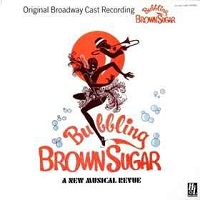 Original Broadway Cast, 1976 (Amherst) No stars, not recommended. This is arguably the least necessary Broadway album ever. Yes, the show was a hit (766 performances), and it served as the template for many black music revues to come, but this musical tour of Harlem in its renaissance days is the rough equivalent of one of those compilation albums that used to be hawked on cable TV. Jazz fans, who already know many recordings and arrangements of these songs, won’t be interested in over-theatricalized renditions of such standards as “Sophisticated Lady,” “Sweet Georgia Brown,” and “God Bless the Child,” while others will be puzzled by the occasional original number — one of which keeps reminding us that “Bubbling Brown Sugar is the stimulating Harlem treat.” This is one A train you don’t have to take — David Barbour
Original Broadway Cast, 1976 (Amherst) No stars, not recommended. This is arguably the least necessary Broadway album ever. Yes, the show was a hit (766 performances), and it served as the template for many black music revues to come, but this musical tour of Harlem in its renaissance days is the rough equivalent of one of those compilation albums that used to be hawked on cable TV. Jazz fans, who already know many recordings and arrangements of these songs, won’t be interested in over-theatricalized renditions of such standards as “Sophisticated Lady,” “Sweet Georgia Brown,” and “God Bless the Child,” while others will be puzzled by the occasional original number — one of which keeps reminding us that “Bubbling Brown Sugar is the stimulating Harlem treat.” This is one A train you don’t have to take — David Barbour
The Madwoman of Central Park West
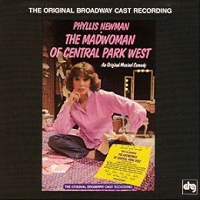 Original Broadway Cast, 1990 (DRG)
Original Broadway Cast, 1990 (DRG)  (3 / 5) This show was a good time, but the cast recording — only 37 minutes in length — is of little help in bringing back the experience for those who saw it, or giving a good idea of it for those who didn’t. The Madwoman of Central Park West is about Phyllis Newman trying to get her life together. It begins as she drags herself out of bed, singing “Up! Up! Up!”, written for an unfinished Skin of our Teeth adaptation by Leonard Bernstein, Betty Comden, and Adolph Green (Newman’s husband). Other numbers included are “What Makes Me Love Him?” (from the Jerry Bock-Sheldon Harnick-Jerome Coopersmith musical The Apple Tree), Ed Kleban’s irresistible song “Better,” and a very funny version of the Bruce Sussman-Jack Feldman-Barry Manilow hit “Copacabana.” But the one item that makes this album essential is “Don’t Laugh,” written by Mary Rodgers and Martin Charnin for Hot Spot (which starred Judy Holliday), then doctored on the road by Rodgers’ friend Stephen Sondheim, who added the wonderful “show me” sections: “Show me a glass of water, I’ll show you a soggy dress / Show me a tube of toothpaste, I’ll show you a mess / Show me a fresh-laid sidewalk and guess where my footprints are / Show me a fire hydrant, I’ll show you my car.” (Note: There was a TV adaptation of The Madwoman of Central Park West, so you may be able to seek that out and see it for yourself.) — David Wolf
(3 / 5) This show was a good time, but the cast recording — only 37 minutes in length — is of little help in bringing back the experience for those who saw it, or giving a good idea of it for those who didn’t. The Madwoman of Central Park West is about Phyllis Newman trying to get her life together. It begins as she drags herself out of bed, singing “Up! Up! Up!”, written for an unfinished Skin of our Teeth adaptation by Leonard Bernstein, Betty Comden, and Adolph Green (Newman’s husband). Other numbers included are “What Makes Me Love Him?” (from the Jerry Bock-Sheldon Harnick-Jerome Coopersmith musical The Apple Tree), Ed Kleban’s irresistible song “Better,” and a very funny version of the Bruce Sussman-Jack Feldman-Barry Manilow hit “Copacabana.” But the one item that makes this album essential is “Don’t Laugh,” written by Mary Rodgers and Martin Charnin for Hot Spot (which starred Judy Holliday), then doctored on the road by Rodgers’ friend Stephen Sondheim, who added the wonderful “show me” sections: “Show me a glass of water, I’ll show you a soggy dress / Show me a tube of toothpaste, I’ll show you a mess / Show me a fresh-laid sidewalk and guess where my footprints are / Show me a fire hydrant, I’ll show you my car.” (Note: There was a TV adaptation of The Madwoman of Central Park West, so you may be able to seek that out and see it for yourself.) — David Wolf
Make a Wish
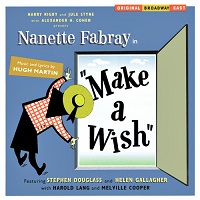 Original Broadway Cast, 1951 (RCA/Sepia)
Original Broadway Cast, 1951 (RCA/Sepia)  (4 / 5) A spiffy overture, a swell opening chorus (“The Tour Must Go On”), then out comes our heroine with an even better character-establishing number, “I Wanna Be Good ‘n’ Bad.” In Hugh Martin’s musical adaptation of Ferenc Molnar’s The Good Fairy, Fabray is a Parisian orphan who breaks away from the orphanage and runs smack into an aspiring barrister, played by Stephen Douglass. The two stars are strictly A-list. As the second couple, Helen Gallagher and Harold Lang play a bickering nightclub duo. The cast album is generous with song-setting dialogue, and Martin’s score is up-tempo and unpretentious, offering lots of chances for this gifted quartet to shine. The ballads are also choice, particularly Fabray’s “What I Was Warned About” and Douglass’s “When Does This Feeling Go Away?” Yet even with a Preston Sturges book and show-stopping Gower Champion dances (the music for one of the ballets is included here), this musical was not a hit — and you can hear why. Halfway through the recording, there’s a silly march (“Paris, France”), and most of what follows sounds like filler. By the time Fabray, Lang, and Gallagher are slamming across “Take Me Back to Texas With You” (“My poor eyes will get all watery / When I see Monsieur Gene Aut-e-ry”), you’ll realize what a hodge-podge the score is, its ambience careening uneasily between Paris and Passaic. Martin’s vocal arrangements, so much fun when he’s serving other composers, just sound garish when he’s working his own stuff into the ground, as in “That Face.” Still, the four leads are tops, and the gold in this mixed bag outweighs the dross. — Marc Miller
(4 / 5) A spiffy overture, a swell opening chorus (“The Tour Must Go On”), then out comes our heroine with an even better character-establishing number, “I Wanna Be Good ‘n’ Bad.” In Hugh Martin’s musical adaptation of Ferenc Molnar’s The Good Fairy, Fabray is a Parisian orphan who breaks away from the orphanage and runs smack into an aspiring barrister, played by Stephen Douglass. The two stars are strictly A-list. As the second couple, Helen Gallagher and Harold Lang play a bickering nightclub duo. The cast album is generous with song-setting dialogue, and Martin’s score is up-tempo and unpretentious, offering lots of chances for this gifted quartet to shine. The ballads are also choice, particularly Fabray’s “What I Was Warned About” and Douglass’s “When Does This Feeling Go Away?” Yet even with a Preston Sturges book and show-stopping Gower Champion dances (the music for one of the ballets is included here), this musical was not a hit — and you can hear why. Halfway through the recording, there’s a silly march (“Paris, France”), and most of what follows sounds like filler. By the time Fabray, Lang, and Gallagher are slamming across “Take Me Back to Texas With You” (“My poor eyes will get all watery / When I see Monsieur Gene Aut-e-ry”), you’ll realize what a hodge-podge the score is, its ambience careening uneasily between Paris and Passaic. Martin’s vocal arrangements, so much fun when he’s serving other composers, just sound garish when he’s working his own stuff into the ground, as in “That Face.” Still, the four leads are tops, and the gold in this mixed bag outweighs the dross. — Marc Miller
Avenue X
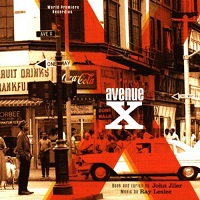 World Premiere Recording, 1997 (RCA)
World Premiere Recording, 1997 (RCA)  (4 / 5) Avenue X shows how some folks in the racially divided America of the early 1960s tried to achieve peace and harmony through rock and roll. The theme is similar to that of Hairspray, but here the locale is Brooklyn rather than Baltimore, and the show ends in tragedy rather than joy. A highly unusual feature of this musical is that all of the songs are sung a cappella, persuasively performed on this recording by an excellent cast. There are only eight singers — Colette Hawley, Cheryl Alexander, Ted Brunetti, John Leone, John-Martin Green, Jerry Dixon, Chuck Cooper, and Wilbur Pauley — yet their vocal harmonies are so lush that they sound like twice that many people. (Dixon is the music director.) Indeed, the wall of sound heard in the arresting “Prologue” may convince you that you’re hearing an orchestra playing along. Rather than advancing the plot or establishing and limning the characters, the songs by Ray Leslee (music) and John Jiler (lyrics) are performance pieces that skillfully conjure the style of the period. Highlights include the ensemble number “A Thousand Summer Nights,” Hawley’s “Woman of the World,” and the two songs that end the show: “Go There,” in which Alexander laments “There are dreams that die before they ever live,” and the touching “Where is Love” (not to be confused with the song of the same title from Oliver!). The CD booklet notes tell us that, “following an extended run Off-Broadway at Playwrights Horizons, [Avenue X] played in roughly two dozen cities, winning ‘Best Musical’ awards and nominations virtually everywhere it has gone.” This recording is a winner, too. — Michael Portantiere
(4 / 5) Avenue X shows how some folks in the racially divided America of the early 1960s tried to achieve peace and harmony through rock and roll. The theme is similar to that of Hairspray, but here the locale is Brooklyn rather than Baltimore, and the show ends in tragedy rather than joy. A highly unusual feature of this musical is that all of the songs are sung a cappella, persuasively performed on this recording by an excellent cast. There are only eight singers — Colette Hawley, Cheryl Alexander, Ted Brunetti, John Leone, John-Martin Green, Jerry Dixon, Chuck Cooper, and Wilbur Pauley — yet their vocal harmonies are so lush that they sound like twice that many people. (Dixon is the music director.) Indeed, the wall of sound heard in the arresting “Prologue” may convince you that you’re hearing an orchestra playing along. Rather than advancing the plot or establishing and limning the characters, the songs by Ray Leslee (music) and John Jiler (lyrics) are performance pieces that skillfully conjure the style of the period. Highlights include the ensemble number “A Thousand Summer Nights,” Hawley’s “Woman of the World,” and the two songs that end the show: “Go There,” in which Alexander laments “There are dreams that die before they ever live,” and the touching “Where is Love” (not to be confused with the song of the same title from Oliver!). The CD booklet notes tell us that, “following an extended run Off-Broadway at Playwrights Horizons, [Avenue X] played in roughly two dozen cities, winning ‘Best Musical’ awards and nominations virtually everywhere it has gone.” This recording is a winner, too. — Michael Portantiere
At the Drop of a Hat
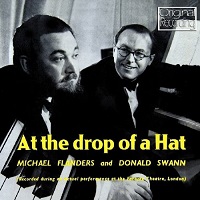 Original Cast (London and Broadway), 1959 (Angel)
Original Cast (London and Broadway), 1959 (Angel)  (4 / 5) Producer Alexander Cohen had the good sense to bring a host of newcomers to Broadway from England, among them Michael Flanders and Donald Swann, the two raconteurs of At the Drop of a Hat. These wonderful songwriters-performers included the audience in their nightly party at the Golden Theatre. (Several years later, Broadway saw the sequel, At the Drop of Another Hat.) The songs are in the grand satirical/political tradition of the late 1950s-early ’60s. Their humor was a little naughty, silly and sophisticated by turns, with lots of allusions that belied the songs’ supposed simplicity. Intellectuals and average theatergoers could find equal amusement in the evening, albeit with different depths of understanding. Wisely, the original cast album was recorded in London before a live audience, which makes all the difference. Not only are we cued as to where the laughs are, but we also feel part of the inside group that’s enjoying these masters of song and monologue. This is one comedy record that can never be overplayed; the music and lyrics sound just as fresh the 50th time as the first, unlike many such albums. — Ken Bloom
(4 / 5) Producer Alexander Cohen had the good sense to bring a host of newcomers to Broadway from England, among them Michael Flanders and Donald Swann, the two raconteurs of At the Drop of a Hat. These wonderful songwriters-performers included the audience in their nightly party at the Golden Theatre. (Several years later, Broadway saw the sequel, At the Drop of Another Hat.) The songs are in the grand satirical/political tradition of the late 1950s-early ’60s. Their humor was a little naughty, silly and sophisticated by turns, with lots of allusions that belied the songs’ supposed simplicity. Intellectuals and average theatergoers could find equal amusement in the evening, albeit with different depths of understanding. Wisely, the original cast album was recorded in London before a live audience, which makes all the difference. Not only are we cued as to where the laughs are, but we also feel part of the inside group that’s enjoying these masters of song and monologue. This is one comedy record that can never be overplayed; the music and lyrics sound just as fresh the 50th time as the first, unlike many such albums. — Ken Bloom
At Home Abroad
 Studio Recordings by the Original Broadway Cast, 1935 (Smithsonian/no CD)
Studio Recordings by the Original Broadway Cast, 1935 (Smithsonian/no CD)  (3 / 5) Star-packed musical revue were always welcome attractions on Broadway during the Depression years. Billed as “A Musical Holiday,” At Home Abroad bolstered its thin and engaging overall theme — Americans traveling to foreign countries — with a fine score by Arthur Schwartz and Howard Dietz and a cast headed by Beatrice Lillie, Ethel Waters, and Eleanor Powell. The show was designed and staged with a good deal of dazzle by a gifted newcomer, Vincente Minnelli; even so, its 198-performance run was felt to be something of a disappointment. Despite this, the cast members made a number of studio recordings of songs from the score, including Waters’ insinuating “Thief in the Night” and two definitive Bea Lillie numbers, “Paree” and “Get Yourself a Geisha” — the latter with its insistent refrain, “It’s better with your shoes off.” As part of an ongoing effort to reconstruct lost musicals, the Smithsonian Institution issued an LP that collected these items and added a few numbers recorded later by Karen Morrow, Nancy Dussault, and other performers. If the score lacks the classic stature of Schwartz and Dietz’s earlier The Band Wagon, there’s still a lot to treasure here, including Eleanor Powell’s extended tap breaks in “What a Wonderful World” and “Got a Bran’ New Suit.” As always with Smithsonian releases, the accompanying notes detail the recordings with both erudition and enthusiasm. — Richard Barrios
(3 / 5) Star-packed musical revue were always welcome attractions on Broadway during the Depression years. Billed as “A Musical Holiday,” At Home Abroad bolstered its thin and engaging overall theme — Americans traveling to foreign countries — with a fine score by Arthur Schwartz and Howard Dietz and a cast headed by Beatrice Lillie, Ethel Waters, and Eleanor Powell. The show was designed and staged with a good deal of dazzle by a gifted newcomer, Vincente Minnelli; even so, its 198-performance run was felt to be something of a disappointment. Despite this, the cast members made a number of studio recordings of songs from the score, including Waters’ insinuating “Thief in the Night” and two definitive Bea Lillie numbers, “Paree” and “Get Yourself a Geisha” — the latter with its insistent refrain, “It’s better with your shoes off.” As part of an ongoing effort to reconstruct lost musicals, the Smithsonian Institution issued an LP that collected these items and added a few numbers recorded later by Karen Morrow, Nancy Dussault, and other performers. If the score lacks the classic stature of Schwartz and Dietz’s earlier The Band Wagon, there’s still a lot to treasure here, including Eleanor Powell’s extended tap breaks in “What a Wonderful World” and “Got a Bran’ New Suit.” As always with Smithsonian releases, the accompanying notes detail the recordings with both erudition and enthusiasm. — Richard Barrios
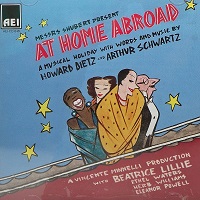 Live and Studio Recordings by the Original Broadway Cast, 1935 (AEI)
Live and Studio Recordings by the Original Broadway Cast, 1935 (AEI)  (3 / 5) The Smithsonian collection might have seemed the last word on At Home Abroad, but guess again. It turns out that there also exists a set of decrepit discs containing recordings of large portions of the show in live performance. Whether or not the source was a radio broadcast is unclear; although the sound quality gives new meaning to the phrase “low fidelity,” the material was skillfully transferred to the digital domain by the intrepid folks at AEI. The studio recordings by Beatrice Lillie, Ethel Waters, and Eleanor Powell noted in the review above are also included on the CD, and the patient listener will be rewarded with a very good sense of how this big and bouncy show operated. AEI obviously took great care with the project, going so far as to splice parts of Lillie’s studio version of “Dinner Napkins” into an otherwise live recording so as to get the best overall sound quality possible. Especially to be enjoyed here are Waters’ live performances of “Loading Time” and “Got a Bran’ New Suit,” which she did not record otherwise. Unfortunately, the CD booklet notes are inadequate — a chronic failing with AEI. And it’s really too bad that the original recording technology sounds as if it relied on tin cans and strings. — R.B.
(3 / 5) The Smithsonian collection might have seemed the last word on At Home Abroad, but guess again. It turns out that there also exists a set of decrepit discs containing recordings of large portions of the show in live performance. Whether or not the source was a radio broadcast is unclear; although the sound quality gives new meaning to the phrase “low fidelity,” the material was skillfully transferred to the digital domain by the intrepid folks at AEI. The studio recordings by Beatrice Lillie, Ethel Waters, and Eleanor Powell noted in the review above are also included on the CD, and the patient listener will be rewarded with a very good sense of how this big and bouncy show operated. AEI obviously took great care with the project, going so far as to splice parts of Lillie’s studio version of “Dinner Napkins” into an otherwise live recording so as to get the best overall sound quality possible. Especially to be enjoyed here are Waters’ live performances of “Loading Time” and “Got a Bran’ New Suit,” which she did not record otherwise. Unfortunately, the CD booklet notes are inadequate — a chronic failing with AEI. And it’s really too bad that the original recording technology sounds as if it relied on tin cans and strings. — R.B.
The Athenian Touch
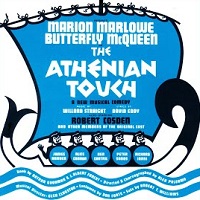 Original Off-Broadway Cast, 1964 (Broadway East/AEI) No stars, not recommended. One day, sometime in the 1980s, several boxes of the long-out-of-print LP of The Athenian Touch turned up in a store in midtown Manhattan. Musical theater enthusiasts swarmed the place, and the shop was depleted of copies in one afternoon. Then people got home and actually played the thing, finding to their dismay that this cast album is as bad as they get. In most musicals, the music is usually the “safest” component; even if the book and/or lyrics are poor, there are often at least a couple of tunes with some appeal. That’s not the case here. Not only do these songs have useless lyrics by David Eddy, but further than that, Willard Straight’s music is ugly. And, judging on the basis of what can be gleaned from listening to the album, the book — a love story involving Aristophanes and some whore — is simply not a professional effort. Camp followers may be interested in the recording because it stars Butterfly McQueen and Marion Marlowe, the Arthur Godfrey TV show favorite who also played Elsa in the original Broadway production of The Sound of Music, but there’s really no other reason to purchase it. — David Wolf
Original Off-Broadway Cast, 1964 (Broadway East/AEI) No stars, not recommended. One day, sometime in the 1980s, several boxes of the long-out-of-print LP of The Athenian Touch turned up in a store in midtown Manhattan. Musical theater enthusiasts swarmed the place, and the shop was depleted of copies in one afternoon. Then people got home and actually played the thing, finding to their dismay that this cast album is as bad as they get. In most musicals, the music is usually the “safest” component; even if the book and/or lyrics are poor, there are often at least a couple of tunes with some appeal. That’s not the case here. Not only do these songs have useless lyrics by David Eddy, but further than that, Willard Straight’s music is ugly. And, judging on the basis of what can be gleaned from listening to the album, the book — a love story involving Aristophanes and some whore — is simply not a professional effort. Camp followers may be interested in the recording because it stars Butterfly McQueen and Marion Marlowe, the Arthur Godfrey TV show favorite who also played Elsa in the original Broadway production of The Sound of Music, but there’s really no other reason to purchase it. — David Wolf
Arms and the Girl
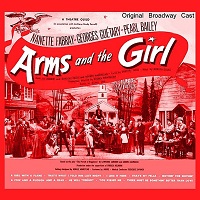 Original Broadway Cast, 1948 (Decca)
Original Broadway Cast, 1948 (Decca)  (3 / 5) The Theatre Guild was riding the success of the still-running Oklahoma! when Armina Marshall Langner suggested that The Pursuit of Happiness, a play she had written with her husband, Lawrence Langner, would make a good musical. Rouben Mamoulian, who had directed the Guild’s earlier successes (including Porgy and Bess, Oklahoma!, and Carousel), was brought in to helm Arms and the Girl. Morton Gould and Dorothy Fields wrote the score, their only Broadway collaboration. Judging from the cast album, the show was distinguished primarily by its three leading performers: Georges Guetary (a French musical theater star), Nanette Fabray, and Pearl Bailey. For Fabray, this was another unsuccessful vehicle that would keep her from achieving major Broadway stardom on a par with Ethel Merman and Mary Martin. Still, her work here is colorful and exciting in “Girl With a Flame” and “That’s My Fella.” She’s great in her duets with Guetary, who does also does well with the charming if corny “A Cow and a Plow and a Frau.” But the big news of the show was Pearl Bailey in a scene-stealing role. She played a slave who changes her name according to where she is geographically — so, as “Connecticut,” she sings the bawdily humorous “There Must Be Something Better than Love” and the lesser “Nothin’ for Nothin’.” Note: The CD edition of this album also includes cast recordings of Up in Central Park; both albums have been meticulously remastered, and they sound as good as any recordings of the period could be expected to. The disc filled an important gap in the catalogue, so we should be grateful to Decca Broadway for its release. — Jeffrey Dunn
(3 / 5) The Theatre Guild was riding the success of the still-running Oklahoma! when Armina Marshall Langner suggested that The Pursuit of Happiness, a play she had written with her husband, Lawrence Langner, would make a good musical. Rouben Mamoulian, who had directed the Guild’s earlier successes (including Porgy and Bess, Oklahoma!, and Carousel), was brought in to helm Arms and the Girl. Morton Gould and Dorothy Fields wrote the score, their only Broadway collaboration. Judging from the cast album, the show was distinguished primarily by its three leading performers: Georges Guetary (a French musical theater star), Nanette Fabray, and Pearl Bailey. For Fabray, this was another unsuccessful vehicle that would keep her from achieving major Broadway stardom on a par with Ethel Merman and Mary Martin. Still, her work here is colorful and exciting in “Girl With a Flame” and “That’s My Fella.” She’s great in her duets with Guetary, who does also does well with the charming if corny “A Cow and a Plow and a Frau.” But the big news of the show was Pearl Bailey in a scene-stealing role. She played a slave who changes her name according to where she is geographically — so, as “Connecticut,” she sings the bawdily humorous “There Must Be Something Better than Love” and the lesser “Nothin’ for Nothin’.” Note: The CD edition of this album also includes cast recordings of Up in Central Park; both albums have been meticulously remastered, and they sound as good as any recordings of the period could be expected to. The disc filled an important gap in the catalogue, so we should be grateful to Decca Broadway for its release. — Jeffrey Dunn
How to Steal an Election
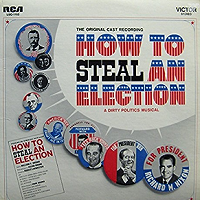 Original Off-Broadway Cast, 1968 (RCA/no CD)
Original Off-Broadway Cast, 1968 (RCA/no CD)  (2 / 5) A young black man (Clifton Davis) and a young white woman (Carole Demas), both veterans of the disastrous 1968 Democratic National Convention in Chicago, somehow meet Calvin Coolidge (D.R. Allen), who essentially gives them a lesson in the various forms of chicanery that resulted in the election of many American presidents. Combining authentic songs from past political campaigns with Oscar Brand’s new book songs for the two young idealists, How to Steal an Election has Cal trying to convince the kids that at least some trickery is necessary for the system to work. (After the young woman sings “Mr. Might’ve Been,” about President Kennedy, Coolidge reveals that her hero was not above some questionable political maneuvers.) The new songs are of varying quality, the old songs are interesting and sometimes funny, and the show’s subject matter is surprisingly topical in the early years of the 21st century. But, of course, the lesson imparted here — that stealing elections is somehow a good thing — is highly debatable. — David Wolf
(2 / 5) A young black man (Clifton Davis) and a young white woman (Carole Demas), both veterans of the disastrous 1968 Democratic National Convention in Chicago, somehow meet Calvin Coolidge (D.R. Allen), who essentially gives them a lesson in the various forms of chicanery that resulted in the election of many American presidents. Combining authentic songs from past political campaigns with Oscar Brand’s new book songs for the two young idealists, How to Steal an Election has Cal trying to convince the kids that at least some trickery is necessary for the system to work. (After the young woman sings “Mr. Might’ve Been,” about President Kennedy, Coolidge reveals that her hero was not above some questionable political maneuvers.) The new songs are of varying quality, the old songs are interesting and sometimes funny, and the show’s subject matter is surprisingly topical in the early years of the 21st century. But, of course, the lesson imparted here — that stealing elections is somehow a good thing — is highly debatable. — David Wolf
archy and mehitabel
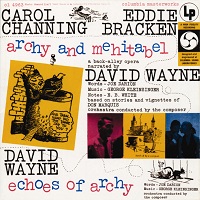 Concept Album, 1954 (Columbia/Masterworks Broadway)
Concept Album, 1954 (Columbia/Masterworks Broadway)  (3 / 5) Based on the 1920s newspaper columns of Don Marquis, archy and mehitabel stars a cockroach. Ostensibly, the columns were the work of said cockroach, named archy, who wrote them for Marquis in exchange for some apple peels left in the trash. The roach handled the mechanics of writing by hurling himself head first at the typewriter keys, and everything was in lower case because he couldn’t reach the shift key. This recording is sort of a grab-bag suite taken from different archy pieces, with scenes and narration by Joe Darion (lyricist of Man of La Mancha) underscored with music by George Kleinsinger (composer of Tubby the Tuba). The underscoring provides a real New York atmosphere, and it occasionally explodes into whimsical songs and entertaining melodic fragments. The text is made of of archy’s thoughts (e.g., “people may think they amount to a great deal, but to a mosquito, they’re just a meal”) and stories of the odd characters he runs into. Most of his stories are about mehitabel (Carol Channing), the alley cat whom he loves unrequitedly. She takes up with a disreputable tomcat that leaves her with a litter of kittens saved by archy (Eddie Bracken) from drowning in a rainstorm. She “studies acting” with a disreputable old theater cat, then reluctantly gives in and takes a job as a house cat — but, unable to stand domesticity, she returns to the alley. In 1957, the piece was adapted for the stage as Shinbone Alley, with a full Kleinsinger-Darion score and a book by Mel Brooks; Eddie Bracken repeated his role, and Eartha Kitt played mehitabel. Three years after the Broadway failure, it turned up in a two-hour TV adaptation with Bracken and Tammy Grimes. Finally, in 1970, it became an animated cartoon with Bracken and Channing. Pirated recordings exist of the TV version, and there is also a complete, live pirate of the Broadway show, but the concept album is the only commercial recording available. — David Wolf
(3 / 5) Based on the 1920s newspaper columns of Don Marquis, archy and mehitabel stars a cockroach. Ostensibly, the columns were the work of said cockroach, named archy, who wrote them for Marquis in exchange for some apple peels left in the trash. The roach handled the mechanics of writing by hurling himself head first at the typewriter keys, and everything was in lower case because he couldn’t reach the shift key. This recording is sort of a grab-bag suite taken from different archy pieces, with scenes and narration by Joe Darion (lyricist of Man of La Mancha) underscored with music by George Kleinsinger (composer of Tubby the Tuba). The underscoring provides a real New York atmosphere, and it occasionally explodes into whimsical songs and entertaining melodic fragments. The text is made of of archy’s thoughts (e.g., “people may think they amount to a great deal, but to a mosquito, they’re just a meal”) and stories of the odd characters he runs into. Most of his stories are about mehitabel (Carol Channing), the alley cat whom he loves unrequitedly. She takes up with a disreputable tomcat that leaves her with a litter of kittens saved by archy (Eddie Bracken) from drowning in a rainstorm. She “studies acting” with a disreputable old theater cat, then reluctantly gives in and takes a job as a house cat — but, unable to stand domesticity, she returns to the alley. In 1957, the piece was adapted for the stage as Shinbone Alley, with a full Kleinsinger-Darion score and a book by Mel Brooks; Eddie Bracken repeated his role, and Eartha Kitt played mehitabel. Three years after the Broadway failure, it turned up in a two-hour TV adaptation with Bracken and Tammy Grimes. Finally, in 1970, it became an animated cartoon with Bracken and Channing. Pirated recordings exist of the TV version, and there is also a complete, live pirate of the Broadway show, but the concept album is the only commercial recording available. — David Wolf
Almost Famous
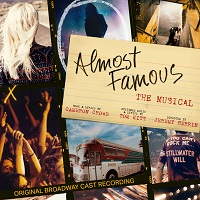 Original Broadway Cast, 2022 (Masterworks Broadway)
Original Broadway Cast, 2022 (Masterworks Broadway)  (2 / 5) Meet the semi-jukebox musical: Almost Famous, based on the film about a 1970s rock band and the teen journalist William (Casey Likes) who embeds himself on tour, blends original songs by Tom Kitt and the film’s screenwriter, Cameron Crowe, with period hits and an occasional song written for the film. The problem is that the jukebox tunes — such as Elton John’s “Tiny Dancer,” Cat Stevens’ “The Wind,” and Joni Mitchell’s “River” — are far superior to the new material, especially as presented through Kitt’s characteristically lovely arrangements. Anika Larsen nails her big number in the role of William’s mother, lamenting in “Elaine’s Lecture” that “rock stars have kidnapped my son.” That’s really the show’s only effective character piece, since most of the new songs for Likes, Chris Wood as band frontman Russell, and Solea Pfeiffer as the mysterious, captivating groupie Penny Lane lack distinction. Pfeiffer in particular sounds stellar, but her songs aren’t worthy of her vocal maturity. The lyrics, by Kitt and Crowe, seldom sculpt the characters with any specificity. And even if songs like “Everybody’s Coming Together” aren’t from the jukebox, in a sense they might as well be: “Come join the revolution tonight / Be part of the solution tonight,” the ensemble sings generically. In a Broadway landscape overtaken by creators trying to make jukebox musicals and film adaptations theatrically viable, Almost Famous isn’t part of the solution on either count. — Dan Rubins
(2 / 5) Meet the semi-jukebox musical: Almost Famous, based on the film about a 1970s rock band and the teen journalist William (Casey Likes) who embeds himself on tour, blends original songs by Tom Kitt and the film’s screenwriter, Cameron Crowe, with period hits and an occasional song written for the film. The problem is that the jukebox tunes — such as Elton John’s “Tiny Dancer,” Cat Stevens’ “The Wind,” and Joni Mitchell’s “River” — are far superior to the new material, especially as presented through Kitt’s characteristically lovely arrangements. Anika Larsen nails her big number in the role of William’s mother, lamenting in “Elaine’s Lecture” that “rock stars have kidnapped my son.” That’s really the show’s only effective character piece, since most of the new songs for Likes, Chris Wood as band frontman Russell, and Solea Pfeiffer as the mysterious, captivating groupie Penny Lane lack distinction. Pfeiffer in particular sounds stellar, but her songs aren’t worthy of her vocal maturity. The lyrics, by Kitt and Crowe, seldom sculpt the characters with any specificity. And even if songs like “Everybody’s Coming Together” aren’t from the jukebox, in a sense they might as well be: “Come join the revolution tonight / Be part of the solution tonight,” the ensemble sings generically. In a Broadway landscape overtaken by creators trying to make jukebox musicals and film adaptations theatrically viable, Almost Famous isn’t part of the solution on either count. — Dan Rubins
